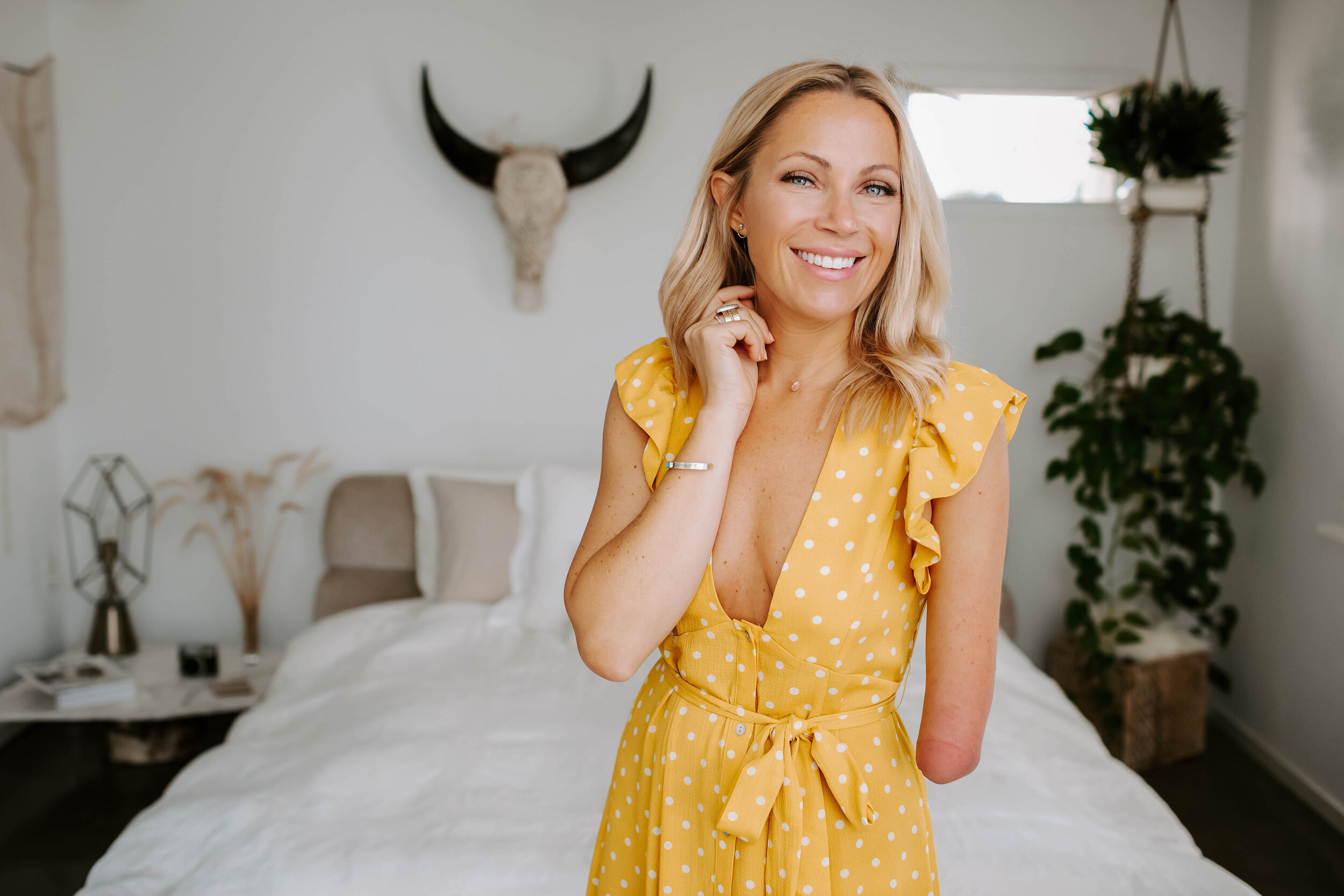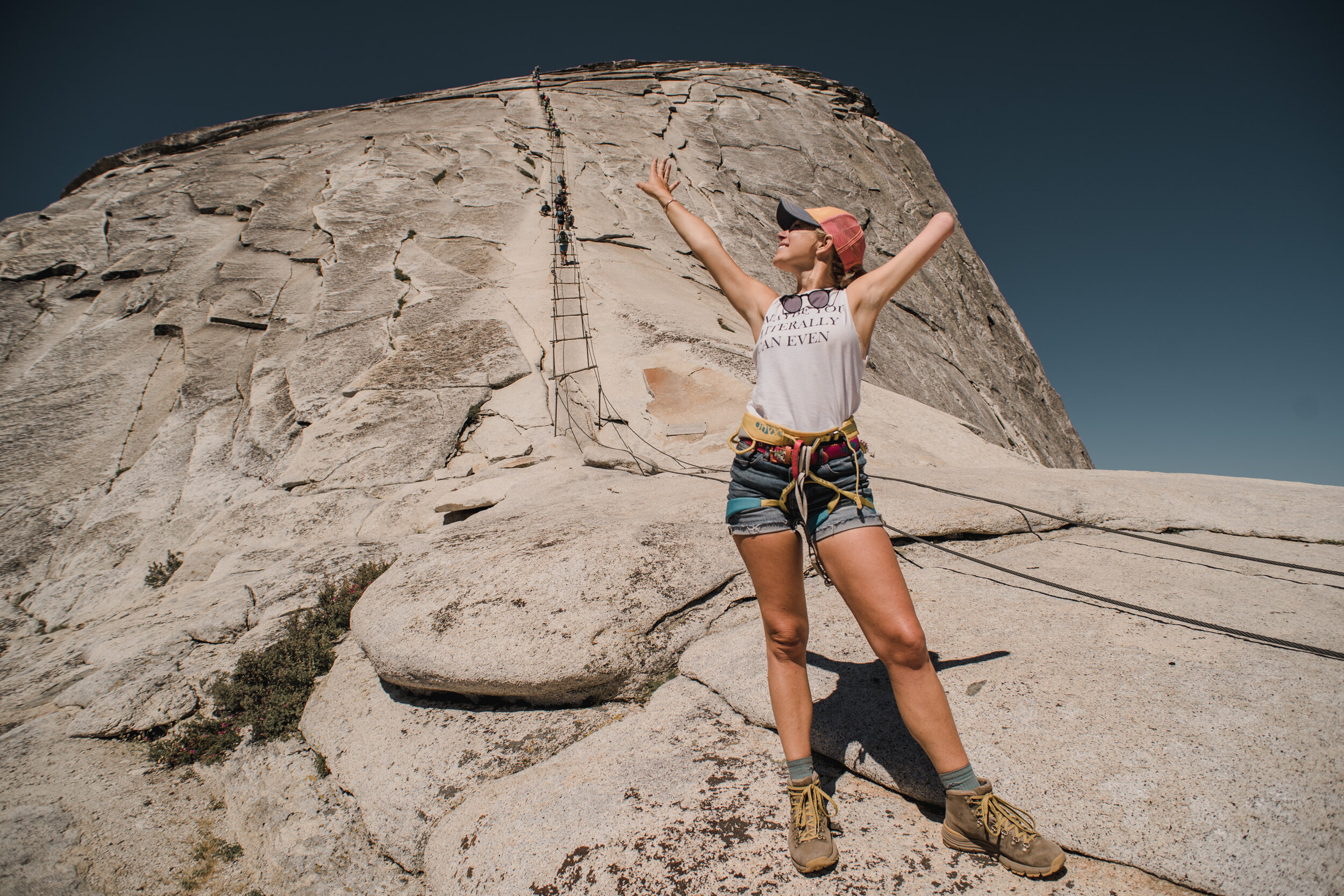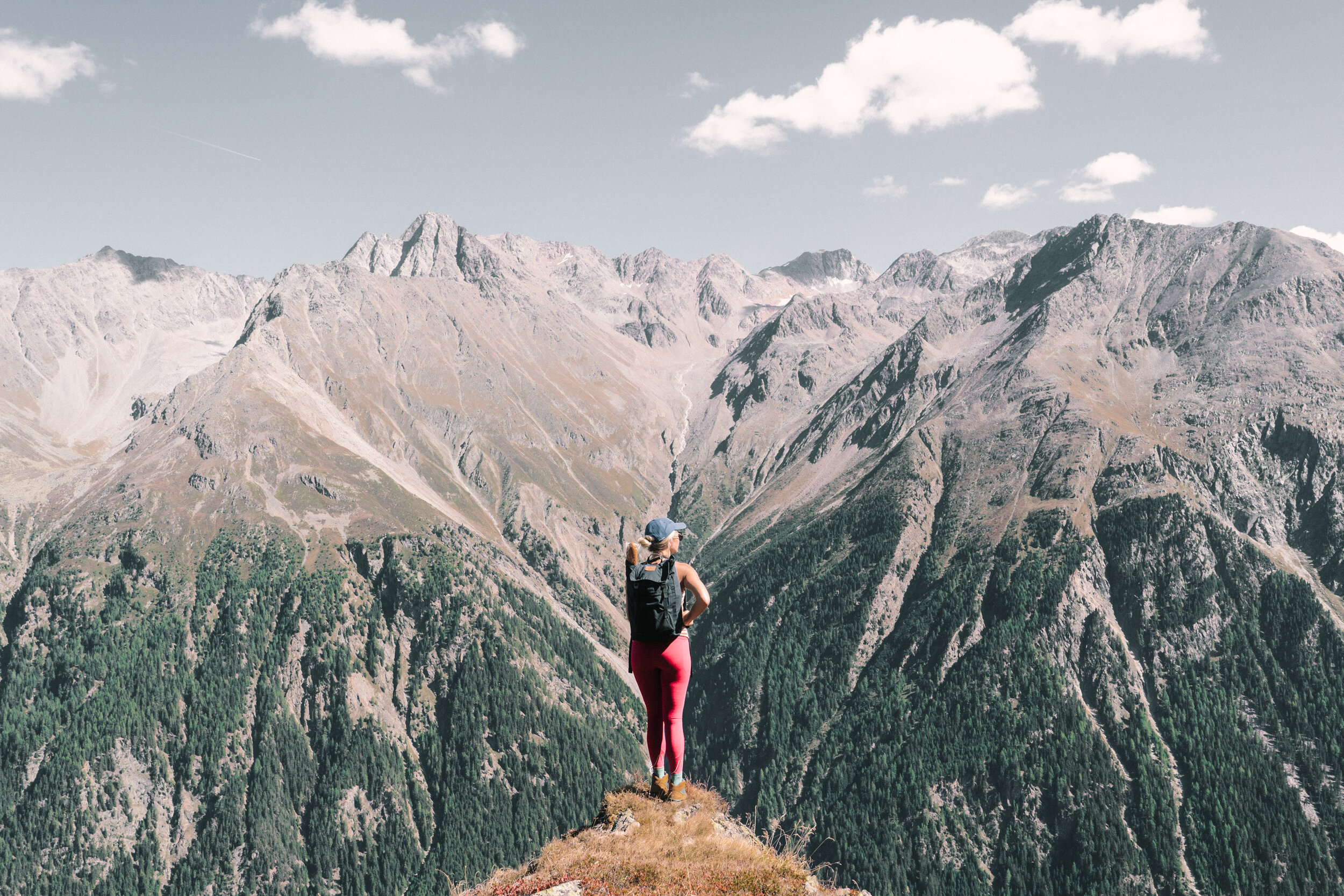IMAGE CREDIT Nicole Balsamo Photography
A Masterclass in Vulnerability
Sarah Herron is a Colorado-native whose personal life was thrust into the spotlight when she went on The Bachelor. You think you know the story. She went on the show, didn’t find love but found the Bachelor Nation (odds are you are a card-carrying member), fame and influence. When I met Sarah, I didn’t know any of this. We were co-workers at 72andSunny and she sat across from me with her Frenchie, Leo. Leo was a good ice-breaker, as he liked to bully my dog out of his under-desk bed. Anyway, Sarah. Sarah was born without her left arm due to Amniotic Band Syndrome, and today we’re talking about her other story, the one that began when her stint on The Bachelor (and Paradise!) ended. It’s a tale about influencer culture. About confidence, comparison, vulnerability and the ongoing dialectic between authenticity and performance. And ultimately it’s about giving herself the power to decide what to do with her story in the first place.
It’s also an interesting time to be having this conversation, as Instagram begins to test hiding the “likes” we get from others when we post. The head of Instagram said the change is intended to "depressurize" the platform, particularly for younger people. In other words, they’re trying to see if hiding “likes” helps dull the competition between users and the comparison culture that Sarah so astutely articulates below. I know we all have opinions about this (Nicki Minaj is PISSED), but instead of dealing hot takes, read what Sarah has to say about the ups and downs of the world we create through our online networks.
- Beth
*this interview has been lightly edited for length and clarity
IMAGE CREDIT Dylan H Brown
ON LOOKING FOR LOVE BUT FINDING A COMMUNITY
I was born without my left arm due to Amniotic Band Syndrome and it never really impacted my life too much. I mean, I struggled with isolation and feeling like I didn't relate to any of my peers, but in the big picture it didn't really impact me until my twenties. I was always extremely creative, so I went to graphic design school and immediately went into advertising. And one day I woke up and realized I was really struggling with self-esteem and confidence, struggling with a community and dating because of only having one arm. At the same time a friend nominated me go on The Bachelor. I really I thought it was my opportunity to come out of my comfort zone. I went on the show, but what ended up happening was women and young girls all across the world started messaging me on social media - that they too had one arm or a physical difference or in some way felt they could relate to me and my experience.
At this same time I learned how to ski and I was doing really well in my career and I started to improve my confidence and self esteem. So I had this outpouring of fans from across the world, seeing on social media that I was skiing and hiking and doing the physical sports that I'd always wanted to do and that I didn't let having one arm holding me back.
I sat with that outreach from these communities for about three years. I didn't know how to respond to this community that had found me. But, with my advertising background my mind is just always churning, and one day the light bulb went off in my head.
ON HOW MAYBE WE LITERALLY CAN EVEN
These girls [who were messaging me] wanted to learn how they too could ski or go on hikes by themselves or have the confidence to do things that they never thought possible. So I said to myself, I don't know how to be a role model or a mentor, but I can definitely take these girls skiing.I had this idea for an organization called SheLift, which is now almost four years old and we have almost 400 members who all have physical differences similar to mine. Twice a year we either go hiking or rock climbing or rappelling or skiing. I work with girls as young as eight, all the way up to mid thirties.
It was so rewarding to me to have this community of girls with physical differences who were connecting, meeting other people like them for the very first time. And it was life-changing for them. But it kind of hit me that it wasn't really changing me all that much. It made me start to wonder if the root of my suffering and what I had been going through, whether it really had anything to do with having one arm, or whether it was more about some deep rooted insecurities and abandonment issues that I was still navigating through.
I think founding She Lift and being able to work through some of those challenges and help mentor girls in overcoming insecurities related to their body opened up a bigger window for me that has been really challenging. That experience transitioned into a bigger body confidence movement that I gravitated towards and found myself wanting to help impact.
A lot of times women struggle to be seen or heard for who they truly are.
SARAH HERRON
ON WHEN THE POT TELLS THE KETTLE TO HAVE MORE CONFIDENCE
At the beginning of the year I started a new workshop called A Course in Confidence. This course was designed to help women navigate through the narrative they'd come up with relating to their body. I call it the self-limiting beliefs, a really well-known term in the life coach arena. I was the queen of self-limiting beliefs, so I wanted to help these women overcome those beliefs and change the narrative that they believed to be true about themselves by having a body positive empowerment photoshoot.
I felt called to help women who didn't just have physical differences but who had acne or eating disorders or mental health problems to work through. I want to help women in a bigger way. And what I learned by doing that and opening myself and holding space for them is that it actually turned a spotlight on a lot of my own issues. I found myself turning myself into a brand, in terms of social media. I felt like my vulnerability became marketable. So I expressed more vulnerability in an effort to get likes, to get followers, and to get people to sign up for my workshop, and it felt incredibly inauthentic and it really created this weird paradox, Like, hang on a second. I'm trying to help women be authentic. But by doing that, I'm being inauthentic and I'm just exploiting my own vulnerability to market myself. It just felt really dirty and it made me feel really, really depressed and bad about myself, and I just decided I couldn't do it anymore.
ON GATEKEEPING VULNERABILITY AND … CELLULITE BUTTS
Brené Brown and a lot of thought leaders on vulnerability talk about how it’s a really special, almost a sacred sharing that shouldn't be exploited and be broadcast to the masses. Yet on social media we get rewarded for being vulnerable. Brené Brown says you should only share your story with a handful of people who deserve to hear it. And Instagram says no, share your deepest, darkest secrets and you'll be instantly rewarded and reinforced with likes and comments and artificial acceptance.
So as an “influencer,” in order to be seen as successful and to feel heard on this platform, I have to up the ante every time. And it got to the point where I hired a professional photographer to take pictures of my cellulite butt. Because I was like, well, I need this for Instagram. I need to expose myself in a way that is so radically vulnerable that women can relate to it, and then I can be more marketable and, and brands want to work with me and I make more money, you know, like it was just sick. And then what would happen was I would see the images of my cellulite butt and feel really bad about myself.
I'm the self-proclaimed authenticity advocate and I felt like it got to a place of producing authenticity, which is just an oxymoron. I think a Course in Confidence evolved into something that made me feel bad about what I was putting out into the world, and it made me feel bad that I was asking other women to do that if they weren’t ready for that same healing.
IMAGE COURTESY OF SARAH HERRON
ON NAVIGATING SOCIAL MEDIA NOW AND SAYING "F@*& IT TO ALL THAT"
I'm still navigating social media because what I know to be true is that if I post a photo about my relationship, it performs really well. And I think that's because coming off The Bachelor, 90% of my audience are Bachelor viewers and all they want to see is that I've found love. And then if I post something inspirational like me rock climbing with one arm, it will do really well because people find it fascinating to see someone with one hand braiding her hair or you know, doing the mundane things that you wouldn’t assume someone with one hand could do.
I know these areas that will perform really well. What’s kind of sad is the things that I'm actually wanting to share like flowers that I saw on a walk or a delicious meal I just ate will not perform well. All because they don't fit into my brand. And that's where it's like this really sad, twisted universe. It's like, well, geez, you know, I can't even share the things that I want because it's not “on brand.” And so a couple months ago I just said fuck it, to all of that. I’m just going to post what I want, and if I end up getting 200 likes on the photo of spaghetti I want to post versus 14,000 likes on a photo of me and my boyfriend…
I think it should just be a rule of thumb to people that you should not post to Instagram with any anticipation of reinforcement of any kind. Like there shouldn't be this idea that if I post I'm going to get a ton of likes, I'm going to get a ton of sympathy or people are going to think I’m inspirational. I just think people should stop thinking that way and just post. If it is vulnerable, are you healed? Are you strong enough to post about it? Are you going to be disappointed if you don't get likes? I think you just need to be okay with the outcome of what you post because there are repercussions for mental health.
ON THE MOTIVATION TO KEEP MOVING AND JOY IN STORY
I was feeling so burnt out. Who in the world would think you get burnt out with Instagram? Where I still find joy, and what I wake up feeling stoked about regardless, is storytelling. I've always been a storyteller and I think it has just taken different shapes. I just love sharing human connections and what women are doing.
No one sees the private SheLift Facebook group that I have, that has 450 women in it. But I wake up and I read through that Facebook group every morning, usually. And the girls are in there sharing dating stories, advice for working out, etc. There’s Jordan, the little girl that built a 3D printer arm that shoots glitter. You may have seen her at SXSW. She has this glitter shooting prosthetic arm, they share ways that they were innovating and coming up with ways to empower each other and work through so many of these obstacles that I faced as a kid and didn't have the community to get advice from. I think that's what stokes me, being able to tell stories and let other women tell their stories. The vulnerability aspect I feel really depleted on. My vulnerability well has run dry for the time being.
IMAGE CREDIT Kelly Lemon Photography
ON HOPE FOR THE FUTURE
I'm hopeful. I have a 19 year old sister, Taylor, and I really use her as a beacon of inspiration and motivation for so much of what I think about the future for girls. I use Taylor as a system of checks and balances sometimes -- how would she absorb information that I'm considering putting out there? How might it make her feel or will she compare herself? Because my sister and her friends have done so well, they're not as caught up in this comparison culture that I feel like my generation is. And I just want them to grow up into their twenties and thirties and know that even though they're bombarded by social media and all these ways that people can become a brand, that doesn't define their value and who they can be in life.
It's just so easy with so many media outlets for women of all ages to feel like, oh, I need to be vulnerable to feel seen, or I need to be in my swimsuit to feel seen, or I need to be an influencer to feel seen. And a lot of times women struggle to be seen or heard for who they truly are. My sister doesn't feel like she needs to be like anybody else. And I think that's what's so inspiring about her and her generation.
We had a discussion at the dinner table around the #MeToo movement. Taylor had been at college for her first semester, and she came home and she had a voice and she had an opinion about it, which I thought was incredible because I don't know if I would've known how to use my voice in the way that she did when I was 19. I don't know if I would've had the tools or the resources or the access to information when I was 19 that she does now. I think that's really hopeful.
We only had Limewire… Stealing Music. Hahaha.
ON WHAT'S ON HER BOOKSHELF
Elizabeth Gilbert, City of Girls
Glennon Doyle, Love Warrior
Jill Santopolo, The Light We Lost
Trashy romance lits.
ON WHAT'S NOT
Another commitment I recently made to myself was to stop reading self-improvement books because it was just perpetuating comparison and I think we can over psychoanalyze ourselves. I was going to therapy once a week and seeing a life coach once a week and reading all the self-help books, so I just need to scale back and go to fiction, literature.
SHE'S OBSESSED WITH
Amy Schumer. She’s my frickin favorite person in the whole world. I love her, her sense of humor and the way she uses her platform. She's great. She’s so real. She’s authentic and I love that.
PARTING THOUGHTS
I think it's a journey of figuring out what sits right with me. And that's okay.
IMAGE CREDIT Dylan H Brown
Interested in learning
more about SheLift?
Find out more online at shelift.org
or follow them on Facebook or Instagram.





